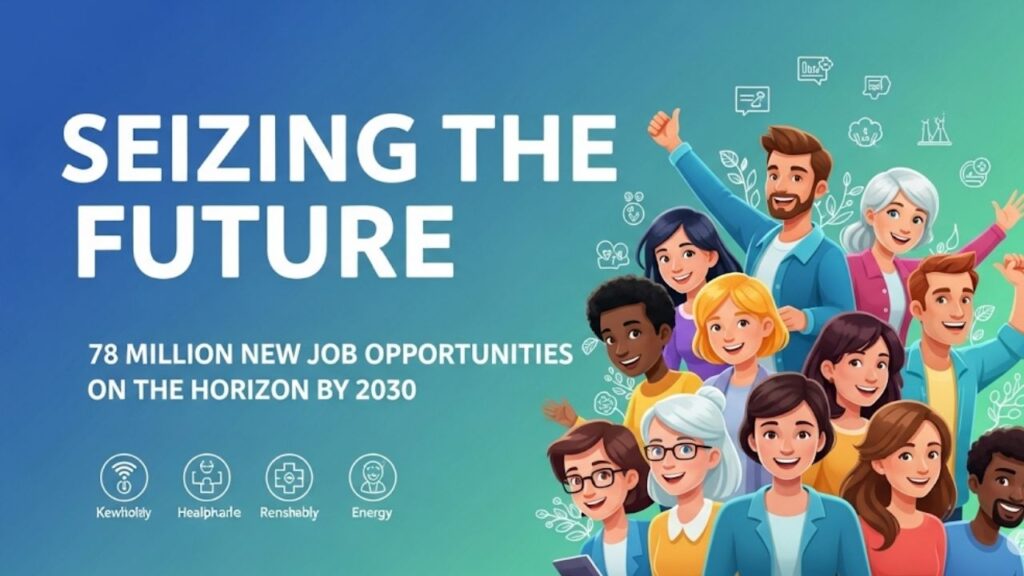78 Million New Job Opportunities – The world of work is on the cusp of a monumental transformation. As the World Economic Forum (WEF) report highlights, a staggering 78 million new job opportunities are projected to emerge by 2030. This isn’t just a number; it’s a beacon of possibility, signaling a dynamic shift in the global employment landscape driven by technological advancements and evolving industry needs. Understanding this evolving terrain is crucial for individuals looking to future-proof their careers and for organizations aiming to thrive in the years to come. This comprehensive guide delves into the key drivers behind this job creation, the skills in demand, and actionable steps you can take to navigate this exciting future.

The projection of 78 million new job opportunities by 2030 is a powerful reminder of the dynamism of the global economy. While the landscape of work will undoubtedly evolve, those who proactively adapt, embrace lifelong learning, and focus on developing in-demand skills will be well-positioned to thrive in the future. This is not just about finding a job; it’s about shaping a fulfilling and successful career in a world of unprecedented opportunity. Start exploring your options, invest in your skills, and embrace the exciting journey ahead.
78 Million New Job Opportunities
Several interconnected forces are fueling this wave of new job opportunities:
- Technological Advancement: Artificial intelligence (AI), machine learning, big data, and cloud computing are not just buzzwords; they are actively reshaping industries and creating entirely new roles. The demand for AI specialists, data scientists, and cloud architects is already soaring, and this trend is expected to accelerate.
- Green Transition: The global push towards sustainability and renewable energy is creating a plethora of “green jobs” in areas such as renewable energy installation and maintenance, sustainable agriculture, and environmental consulting. This transition is not just an environmental imperative but also a significant economic driver.
- Digital Transformation: Businesses across all sectors are embracing digital technologies to enhance efficiency, reach new markets, and improve customer experiences. This necessitates a workforce skilled in areas like cybersecurity, software development, digital marketing, and e-commerce.
- Evolving Consumer Needs: Changing demographics and consumer preferences are also influencing job creation. The growing emphasis on health and well-being, for instance, is driving demand in healthcare, wellness, and personalized services. Similarly, the experience economy is fueling growth in areas like tourism and hospitality, albeit with a greater focus on technology integration.
The Skills in Demand for Tomorrow’s Jobs
To capitalize on these emerging job opportunities, individuals need to proactively develop the skills that will be most valued in the future. The WEF report highlights several key skill clusters:
- Cognitive Skills: This includes critical thinking, problem-solving, analytical skills, and creativity. As routine tasks become automated, the ability to think critically and solve complex problems will be paramount.
- Technological Skills: Beyond specialist tech roles, a foundational understanding of technology and digital literacy will be essential across various professions. This includes data analysis, understanding AI applications, and adapting to new software and platforms.
- Self-Leadership Skills: Adaptability, resilience, lifelong learning, and self-management are crucial for navigating a rapidly changing job market. The ability to take ownership of one’s professional development will be increasingly important.
- Interpersonal Skills: Collaboration, communication, empathy, and leadership remain vital, even in an increasingly digital world. The ability to work effectively in teams and build strong relationships will be a key differentiator.
Navigating the Future Job Market: Actionable Steps
The prospect of 78 million new jobs is encouraging, but proactive steps are necessary to position yourself for success.
- Identify In-Demand Fields: Research the industries and roles that are projected to experience significant growth. The WEF report ([link to World Economic Forum website or relevant report page on future jobs] – opens in a new tab) provides valuable insights. Consider your existing skills and interests and identify potential overlaps with these emerging areas.
- Embrace Lifelong Learning: The skills landscape is constantly evolving, so a commitment to continuous learning is essential. Explore online courses, workshops, certifications, and degree programs that align with your career goals and the skills in demand. Platforms like Coursera ([link to Coursera website] – opens in a new tab) and edX ([link to edX website] – opens in a new tab) offer a wide range of learning opportunities.
- Focus on Transferable Skills: Develop core skills that are applicable across various roles and industries, such as critical thinking, communication, and problem-solving. These transferable skills will provide a strong foundation regardless of specific job titles.
- Network Strategically: Build connections with professionals in your field of interest and in emerging areas. Attend industry events, join online communities, and leverage platforms like LinkedIn ([link to LinkedIn website] – opens in a new tab) to expand your network and learn about new opportunities.
- Seek Out Opportunities for Upskilling and Reskilling: Many companies and government initiatives are offering programs to help individuals acquire new skills. Explore these resources and consider how they can support your career development. For example, organizations are increasingly investing in AI upskilling for their existing workforce.
- Be Adaptable and Open to Change: The future of work will likely involve more frequent career transitions and the need to adapt to new roles and responsibilities. Cultivating a mindset of flexibility and embracing change will be crucial for long-term career success.
- Develop Your Digital Literacy: Ensure you have a strong foundational understanding of digital technologies relevant to your field. This could involve learning to use new software, understanding data analytics basics, or familiarizing yourself with AI tools.

The Role of Organizations
Businesses also have a critical role to play in preparing for the future of work. This includes:
- Investing in Employee Training and Development: Organizations need to proactively upskill and reskill their existing workforce to meet the demands of new roles.
- Creating a Culture of Lifelong Learning: Encourage employees to continuously learn and adapt by providing resources and opportunities for professional development.
- Adopting Flexible Work Models: Embracing remote work and other flexible arrangements can attract and retain talent in a changing job market.
- Focusing on Human-Machine Collaboration: The future of work will involve greater collaboration between humans and technology. Organizations need to design roles and workflows that leverage the strengths of both.
FAQ
What are the main industries expected to see the most job growth by 2030?
Reports suggest that the green economy, technology sectors (especially AI and data science), and healthcare are likely to experience significant job growth.
How can I prepare for jobs that don’t even exist yet?
Focus on developing foundational skills like critical thinking, adaptability, and digital literacy. Cultivate a growth mindset and be open to continuous learning and exploring new technologies.
Is it worth going back to school for a career change related to these new job opportunities?
Depending on your current skills and career goals, further education or specialized training can be a valuable investment. Research programs that align with in-demand skills and emerging industries.
What role will remote work play in these future job opportunities?
Remote work is likely to continue to be a significant trend, offering flexibility and access to a wider talent pool. Many of the emerging tech-related roles are well-suited for remote work arrangements.
How can I identify which skills are most important to develop for the future job market?
Consult reports from organizations like the World Economic Forum, analyze job market trends in your areas of interest, and network with professionals in those fields to understand the skills they value.






